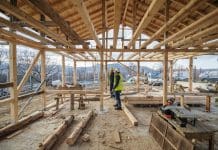Thousands of empty homes across England could be restored if councils are allowed to double the rate of extra council tax on empty homes, local government leaders say
The Local Government Association is urging peers to back an amendment to the Rating (Property in Common Occupation) and Council Tax (Empty Dwellings) Bill to give councils the authority to increase the empty homes premium thresholds on council tax bills for homes vacated for between two and five years from 50% to up to 100%.
For homes empty for between 5 and 10 years, councils would be able to increase the premium by up to 200% and up to 300% for homes empty for 10 years or more.
Councils work to encourage owners of empty homes to bring their properties back into use. As the majority of long-term empty properties are privately owned, this means also working with voluntary groups, private owners and government bodies to bring properties back into use. This includes providing advice and information, grants and loans and levying the existing empty homes premium through council tax.
The LGA said it is essential for the Government to ensure all areas of the country can borrow to invest and keep 100% of receipts from properties sold through Right to Buy to replace homes and reinvest in new housing.
Councillor Richard Watts, Chair of the LGA’s Resources Board, said: “At a time when we face a chronic housing shortage across the country it is wrong for so many homes to be left empty. Councils work hard to address the issue but the existing powers open to them are complex and difficult to use.
“Providing councils with the ability to charge more for empty homes would be a hugely positive measure which will enable councils to incentivise owners of long-term empty homes to bring them back into use.
“Bringing empty homes into use is just one aspect of our housing problems.
“Councils need to play a leading role in solving our housing crisis. For that to happen, all councils should be able to borrow to build and keep 100% of the receipts of any Right to Buy homes that are sold to boost the supply of genuinely affordable homes with the necessary infrastructure.”
As the LGA call for a higher tax on empty homes, a major coalition launches to call for investment-based solutions in areas with high levels of empty properties.
Empty Homes Campaign Manager, Chris Bailey said: “At a time when across England over 205,000 homes stand long-term empty and for the first time in a decade this number is rising, it is welcome to see local authorities focus on this huge waste of valuable housing resources.
“Yet current enforcement powers have offered few answers to the areas where this problem is most concentrated, in England’s under-invested communities.
“Communities blighted by a spiral of decline where those with housing choices have often left, trapping those with none in poor quality, often privately rented accommodation.
“So while we welcome any focus by local authorities on the problem we believe that the answers are to be found in investment.”
The Coalition is backed by organisations from across the private, public and social housing sectors as well as by campaigning organisations and industry bodies.
The Coalition is chaired by cross-bench peer and former LGA President, Lord Best and is coordinated by Empty Homes – it is supported by the following organisations:
- Association of Residential Letting Agents / National Association of Estate Agents: Propertymark
- Crisis
- Empty Homes, national campaigning charity
- Federation of Master Builders
- Locality
- National Community Land Trust Network
- Northern Housing Consortium
- National Housing Federation
- Residential Landlords Association.
This coalition of organisations from across social, private and local authority housing sectors has united to call for government to build upon recent legislation empowering local authorities to charge an increased 100% council tax premium on empty homes, with a positive programme of investment which focuses on the issue of concentrations of empty homes in what it identifies as ‘under-invested communities’.
Coalition members believe that this issue can only be effectively addressed with the support of targeted regional investment.
The launch will bring together a cross-party group representing areas with high levels of empty homes and those critically concerned about the waste of over 205,000 long-term empty homes.
















